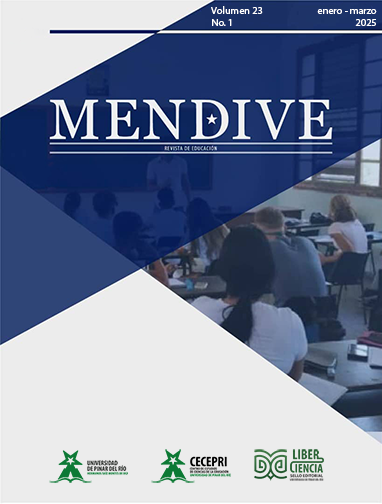Design of an assessment task for self-regulated learning of education professionals
Main Article Content
Abstract
The development of self-regulated learning is crucial for education professionals, as it allows educators to reflect on their own teaching, identify areas for improvement, and adapt their methods to meet the needs of students. This work aims to analyze how the implementation of an assessment task can enhance educators' ability to self-regulate their learning. To achieve this objective, the qualitative empirical technique of group interviews with participants and the quantitative empirical technique of studying grade frequencies were used. In addition, rational methods such as analytical-synthetic and inductive-deductive were used to assess and interpret the empirical data collected. The results indicated that both the practical execution during the course and the oral defense of the final assessment task contributed positively to the development of self-regulated learning of the participants. The initiative presented in this study can be a path of professional development that directly contributes to raising self-regulatory knowledge and skills that allow constant autonomous preparation for education professionals.
Downloads
Article Details

This work is licensed under a Creative Commons Attribution-NonCommercial 4.0 International License.
References
Cleary, T. J., Kitsantas, A., Peters-Burton, E., Lui, A., McLeod, K., Slemp, J., & Zhang, X. (2022). Professional development in self-regulated learning: Shifts and variations in teacher outcomes and approaches to implementation. Teaching and Teacher Education, 111, 103619. https://doi.org/10.1016/j.tate.2021.103619
Guàrdia, L., Bekerman, Z., & Zapata, M. (2024). Presentación del número especial "IA generativa, ChatGPT y Educación. Consecuencias para el Aprendizaje Inteligente y la Evaluación Educativa". RED. Revista de Educación a Distancia, 24(78). http://dx.doi.org/10.6018/red.609801
Ibarra, M. S., Lukas, J. F., Ponce, N. & Rodríguez, G. (2023). Percepción del profesorado universitario sobre la calidad de las tareas de evaluación de los resultados de aprendizaje. RELIEVE, 29(1). http://doi.org/10.30827/relieve.v29i1.27704
Kramarski, B., & Heaysman, O. (2021). A conceptual framework and a professional development model for supporting teachers' "triple SRL-SRT processes" and promoting students' academic outcomes. Educational Psychologist, 56(4), 298-311. https://doi.org/10.1080/00461520.2021.1985502
Senra, N., López, M. M. & Bravo, G. (2023). Concepción psicopedagógica para la estimulación metacognitiva en la formación inicial del Licenciado en Educación. Mendive. Revista de Educación. 21(3), pp. e3363 https://mendive.upr.edu.cu/index.php/MendiveUPR/article/view/3363
Theobald, M. (2021). Self-regulated learning training programs enhance university students' academic performance, self-regulated learning strategies, and motivation: a meta-analysis. Contemporary Educational Psychology, 66, 101976. https://doi.org/10.1016/j.cedpsych.2021.101976
Trías, D., Eiroa, C., & Ronqui, V. (2023). Enseñanza y aprendizaje autorregulado en el ejercicio de la docencia. En I. Achard (Ed.), Mejorar la enseñanza. Fortalecer la formación y el desempeño de los docentes (pp. 75-86). Universidad Católica del Uruguay. https://liberi.ucu.edu.uy/xmlui/handle/10895/1839
Trías, D., Sastre, H., & Cuadros, O. E. (2024). Motivación y autorregulación en el desempeño en matemáticas en estudiantes de Educación Secundaria. Revista Colombiana de Educación, (92), 209-232. https://doi.org/10.17227/rce.num92-17121
Valdez, H. I., & Armas, C. B. (2022). Autorregulación del aprendizaje en entornos con presencia de las TIC. Referencia Pedagógica, 10(3), 180-194. http://scielo.sld.cu/pdf/rp/v10n3/2308-3042-rp-10-03-2.pdf
Valencia, M. (2022). Un acercamiento a la psicología popular para pensar la promoción del aprendizaje autorregulado en la educación superior. Revista Ciencias de la Educación, 32(60), 600-622. http://servicio.bc.uc.edu.ve/educacion/revista/60/art08.pdf
Valencia, M. (2020). Diseño de tareas para promover aprendizaje autorregulado en la universidad. Educación y Educadores, 23(2), 267-290. https://doi.org/10.5294/edu.2020.23.2.6
Vizcaino, A. E., Céspedes, H. T., Matos A. G., Sáez, F., & Olena, J. A. (2024). Aprendizaje autorregulado, rendimiento y estrés académico en estudiantes universitarios. Revista Médica Electrónica, 46 http://www.revmedicaelectronica.sld.cu/index.php/rme/article /view/5780/597
Zimmerman, B. (2013). From cognitive modeling to self-regulation: a social cognitive career path. Educational Psychologist, 48(3), pp. 135-147. https://doi.org/10.1080/00461520.2013.794676


